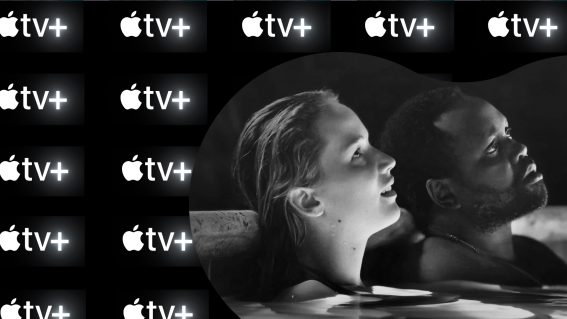Learn more about Raised By Wolves from its creator and stars
“Yeah, the suits, man… I think I’ve got the smell of lube out of my skull, so it’s all good.”
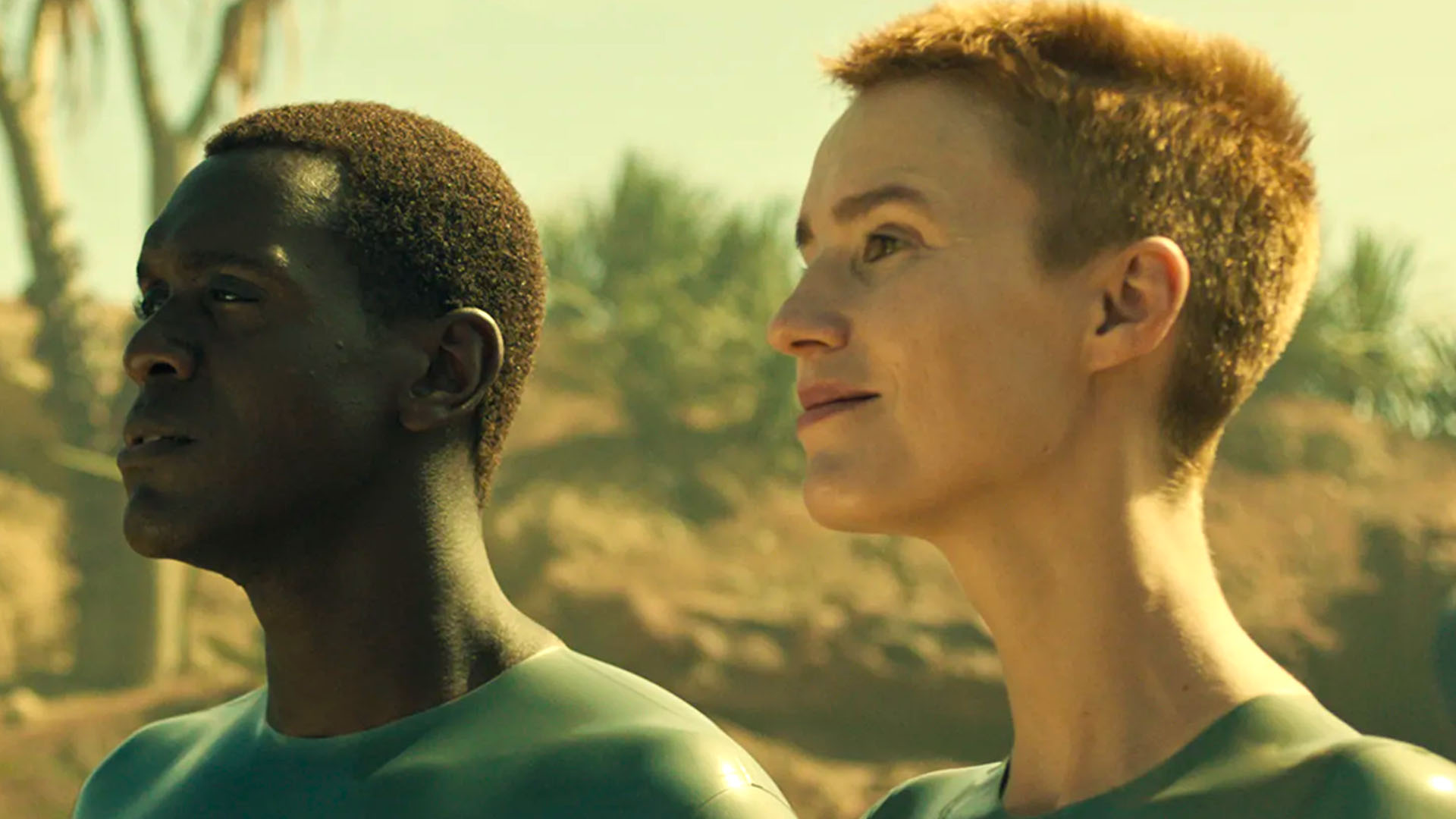
The second season of sci-fi series Raised by Wolves is now streaming on Neon. Steve Newall joined the show’s creator and stars to learn more about the show and its new season (contains minor spoilers – speaking of which, if you need a refresher on season one, catch up here).
THIS INTERVIEW HAS BEEN EDITED FOR LENGTH AND CLARITY
What was it like to see the reaction to season one?
AARON GUZIKOWSKI (SHOWRUNNER): It was a lot of fun, actually—because I had to live with it just in my mind for so long—just to have it out there and hear other people talking about it.
So it was really gratifying. It’s always fascinating to read people’s theories and kind of figure out how people are reacting to things. It’s a lot of fun. It’s nerve wracking in some respects. But I think it was more relieving than nerve-racking just because you just feel like you’re going crazy. You have all this information and story and visions in your head, and it’s great to have them all out there. And, you know, people talking about it. It’s really nice.
Ridley Scott was more than a director/executive producer, he was an early champion of the show
AARON GUZIKOWSKI: It could have been more challenging, I think, if not for Ridley Scott being hugely supportive of the vision for the show. He understood what I was trying to do and was extremely supportive of that.
Having his blessing and his confidence allowed us to do some stuff that we may not have been able to do otherwise. In that sense, we were very lucky that we had Ridley as a champion for the show that just allows us to do things that just really go there, you know, go to really extreme places and and talk about really touchy subjects and delve down deeply, which is exactly what we wanted to do. So I think in a lot of ways it seemed like it was going to be more challenging in that sense.
But I think we’re at a point now where I think HBO Max and everybody else, we’re all on the same page. We’re all making the same show. And I think that’s usually when you get into a problem, when you have people and they’re just not making the same show. They don’t have the same sort of vision in their head. But I think here we’ve been lucky in that I think everyone’s kind of come around to this, this weird beast that is this show.
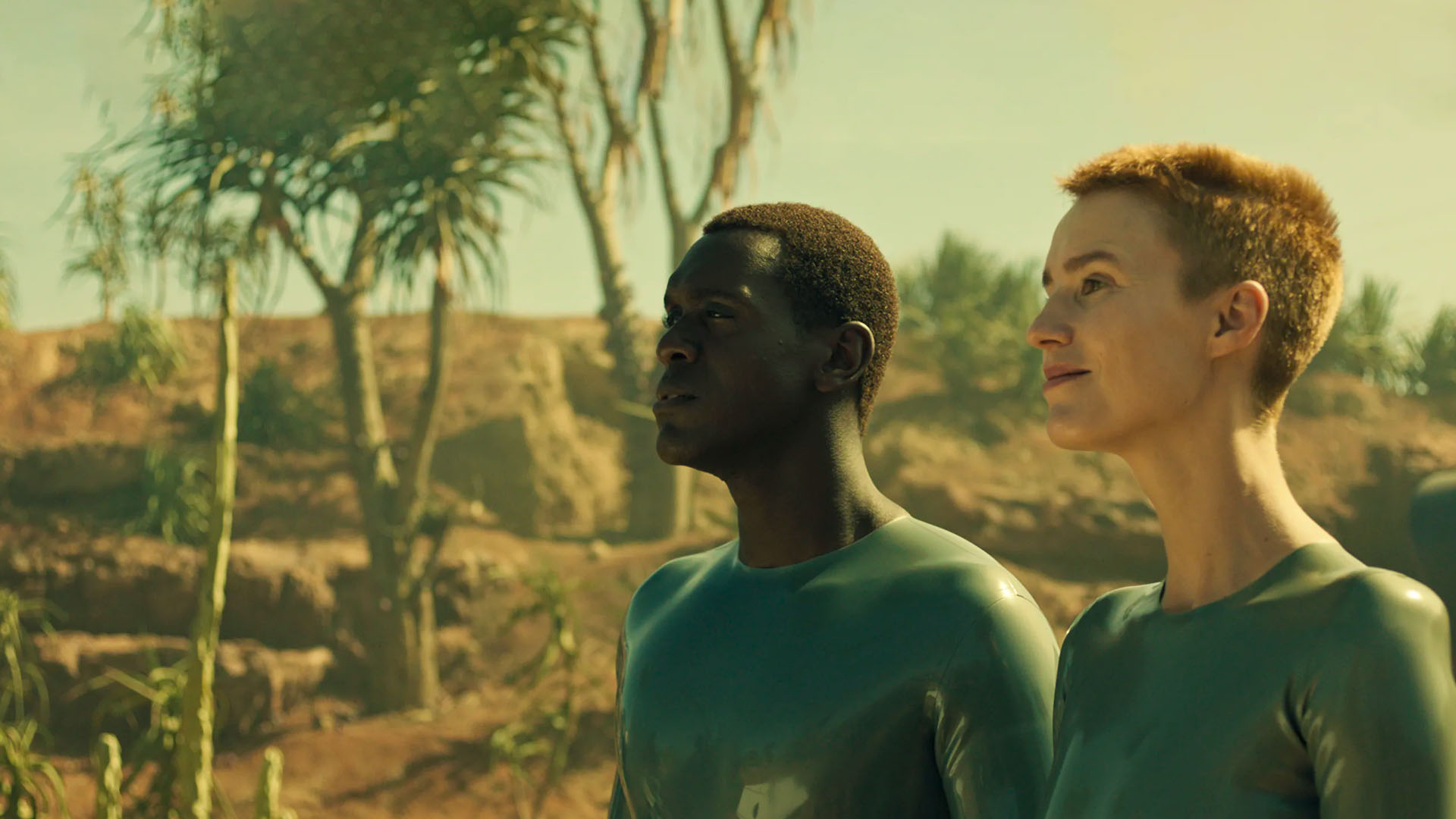
The show’s androids on getting back into their suits for season two
AMANDA COLLIN (MOTHER): There’s a lot of people in the season which is so different, right? And a lot of technical stuff and tanks, and I was so excited about that. We were very deserted in season one, so that’s a big change. It’s very, you know, space techy—I don’t know if that’s a word, but I love that in season two.
And regarding the suit, you know, it takes a long time to pee. I’m just going to leave it at that.
ABUBAKAR SALIM (FATHER): Yeah it definitely feels different. And I think we all felt that this, you know, that the pace was a lot faster and it was a lot more punchy.
And it feels like because we know these characters and we’re already on this path with them, it’s a lot easier to get to introduce new characters and everything because as an audience, you’re seeing it through characters that you already know. So yeah, it’s a definite definite change of pace and and feeling to this season.
And yeah, the suits, man… We just have to accept that they’re a thing and live with it. I think I’ve got the smell of lube out of my skull, so it’s all good.
NIAMH ALGAR (SUE): I feel like I have to explain on your behalf… Basically, the suits collect dust if you so much as walk past them, so they had to cover them in lube to create that shiny effect. So every now and again, you’d be preparing to do a scene with either Amanda or Abu, and you’d see the costume department run in and and start wiping them down with lube just before a scene.
I don’t know if that was part of the costume or was this part of the contract, but it’s interesting.
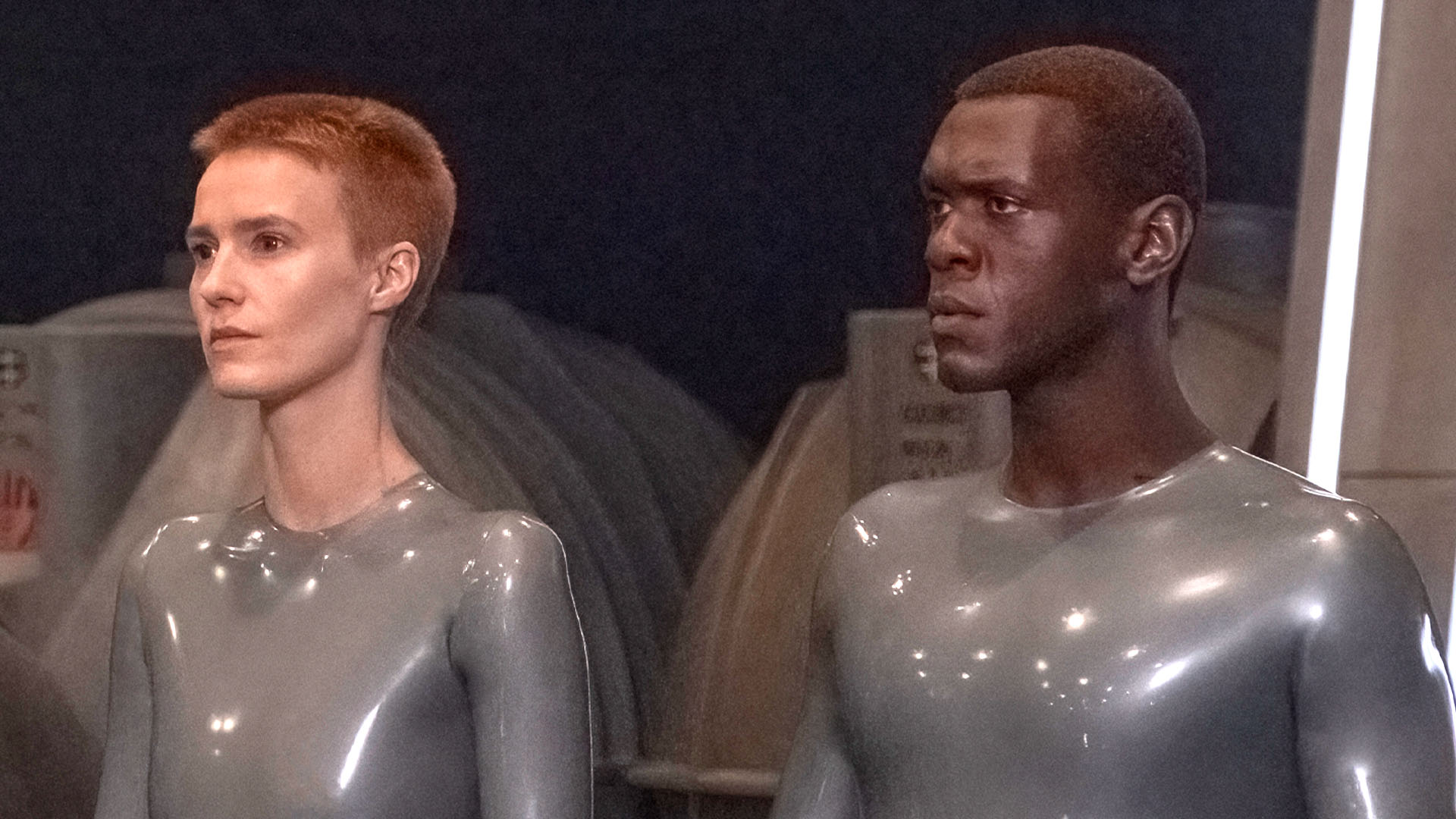
Does everyone know where Raised By Wolves is going to end up?
ABUBAKAR SALIM: We don’t know anything, mate, we’re as informed as the audience are. Aaron is definitely the maestro in regards to controlling where the stories in these characters journeys are going. I think by us not knowing—and Amanda has said it before—it’s kind of like life, you have no idea, really, and I think there is something quite exciting about that. But yeah, we have no idea. I don’t anyway.
AMANDA COLLIN: Like life, you have to accept and let go all the time. I do at least. I mean, just let go that I don’t know what’s happening in three months.
AARON GUZIKOWSKI: I have a plan [for the show]. It’s sort of a framework—like if you’re building a house, they have kind of the basic architecture.
But then as you’re building it, you’re in the rooms, you’re decorating and there’s so much else going on that you can’t really get a handle on until you start making it—and then hopefully it starts kind of talking back to you and it starts telling you what it wants to be. And that, I think, is the the greatest thing about being able to write something and then watch as you’re writing. You get this interesting creative feedback system, because you are seeing it so soon after you’ve written it that it can actually help influence where the story’s going to go.
In the larger sense, you know, we have a map. But I think as you zoom closer into that map, things can change.
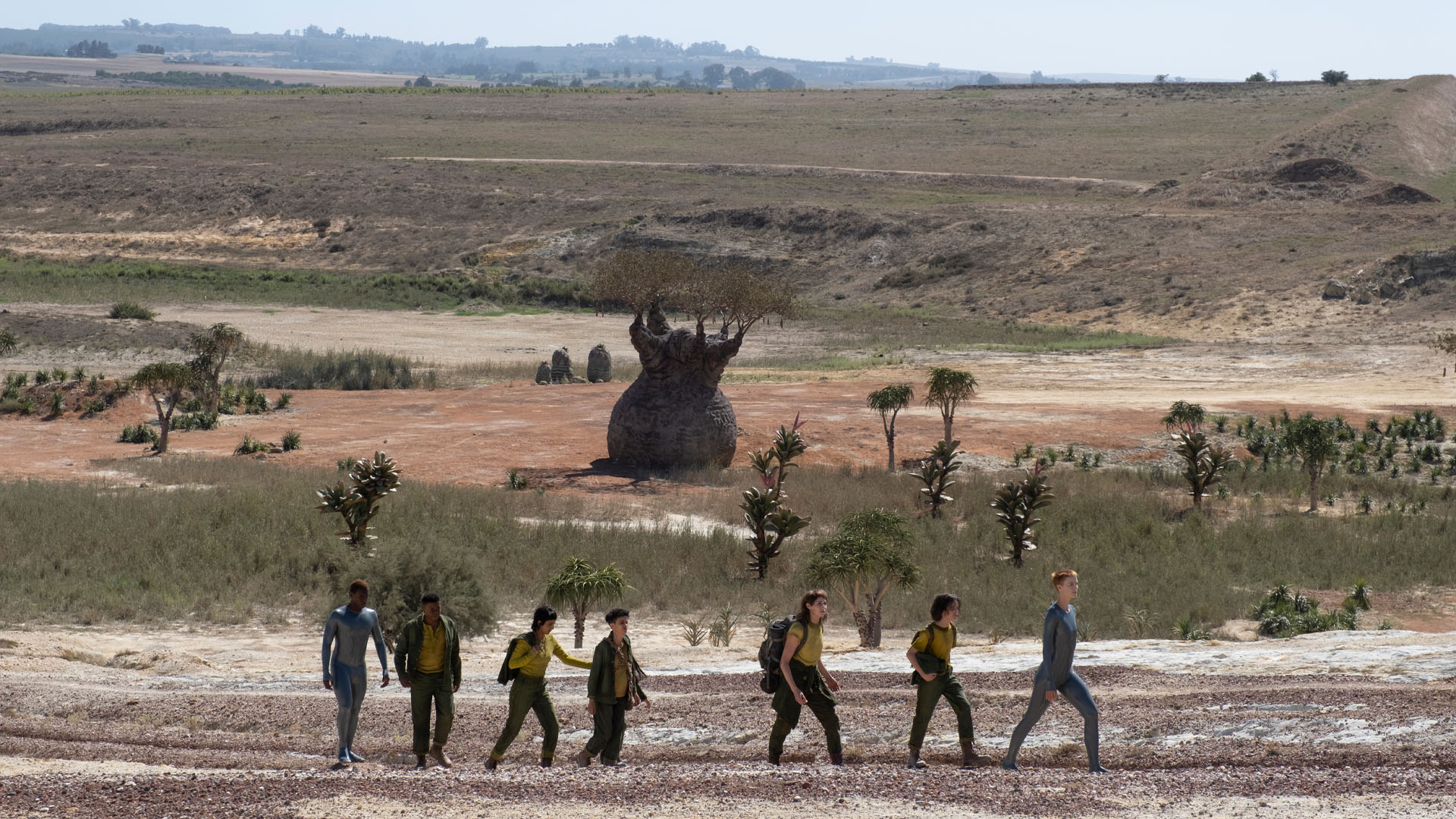
The religious, mythological and historical inspirations
AARON GUZIKOWSKI: We definitely get inspiration from all manner of ancient stories from Earth. You know, the Bible, Greek mythology, things like that—but not one specifically, per se. I think in some ways we’re saying all of these things are connected. That through mythology, ancient Egypt, the Bible—and the entire history of Earth—that there are some common denominators in all of those mythologies and belief systems.
And we try and play around with some of that, that notion. But I think it’s not really specific to any one period of time. I think even here on Earth, we’re always in these kinds of cycles where we are kind of living the same thing over and over again, but with different players, you know, different places and circumstances—but the events and the results often are very similar.
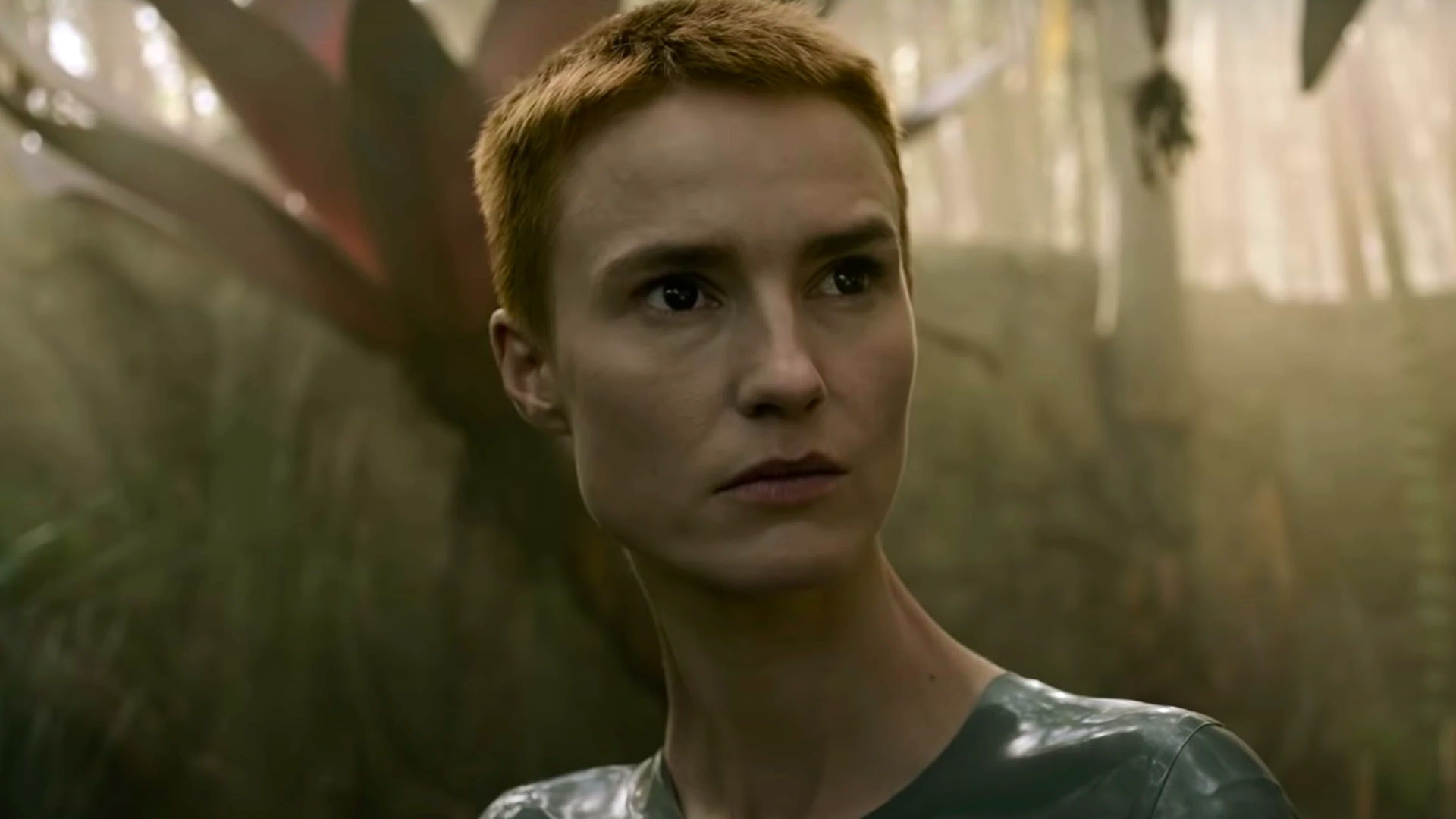
Science fiction is a fantastic way of telling both complex and commonplace stories
AARON GUZIKOWSKI: To me, one of the great aspects of science fiction is that it’s so malleable in terms of talking about things that are going on today or trying to filter our experience of modern life.
And I think in trying to extrapolate that and putting it on a different planet, with a different environment, you can start to understand things on more of a deeper level because you’re not being so distracted with all of the familiar things that we immediately have these reactions to. You can get deeper and tell stories that are more, primal and human because you’ve stripped away a lot of the artifice, all of this stuff we have here on Earth.
And as soon as you start adding that stuff in, because we live here, our minds immediately start reacting—it’s great to go someplace where you have this neutral kind of relationship to it because it’s alien. We don’t really understand it. We only understand that those are human beings. And so we can really follow their experiences without taking our own prejudices along with us.
And I think by doing so, we can really explore really interesting themes and ideas that are just much more difficult to explore, you know, in a modern day Earth bound story.
ABUBAKAR SALIM: It [science fiction] acts as a sort of conduit, using incredible themes that we are dealing with anyway in society.
And you put it in a world in which is digestible to audiences from all over the world where we can all relate to, right? Science fiction, fantasy, that kind of genre, they’re such powerful tools in storytelling—putting you in the shoes of someone else, seeing the other side of things and seeing other opinions in a medium in which you feel safe to explore. And I think that’s what’s important and really powerful about this.
Again, if you look at both me and Amanda’s characters and actually even Sue as well, as parents, they’re not the perfect parents, right?
We’re very human, and it’s very hard to dive into that sort of territory when it comes to looking at something that feels too close to home. But when you have something as science fiction or something as fantastical as the world that we have now, there’s a lot more room to play and a lot more truth that you can bear in those scenarios.
AMANDA COLLIN: And also, as an audience, I think for me, at least, it’s easier to tap into what’s going on in your own world and then compare it to the story that’s being told instead of watching something that’s naturalistic. And then you can always push it away and say, “Oh, but this person is different from me”. But here, in science fiction, you’re allowed to tap into the places where you can recognise something and then identify with that.
I think it’s so cool. I love it. I’m in love with telling stories this way.
NIAMH ALGAR: As regards the science fiction, if you started to overthink everything that’s going on, your brain as an actor would explode.
Aaron has created this whole story, but it is all based around family and what family means and and how if we don’t have that, what is it that we are, actually? If we don’t have love, we don’t have trust or care for one another, what are we actually fighting for, living for?
And so you know, this is a show that asks these kind of, quote, big questions, but does it in a way that is so visually pleasing and entertaining—and he’s able to broach these big questions that kind of leave you as an audience member, questioning if this can actually possibly happen and could happen.
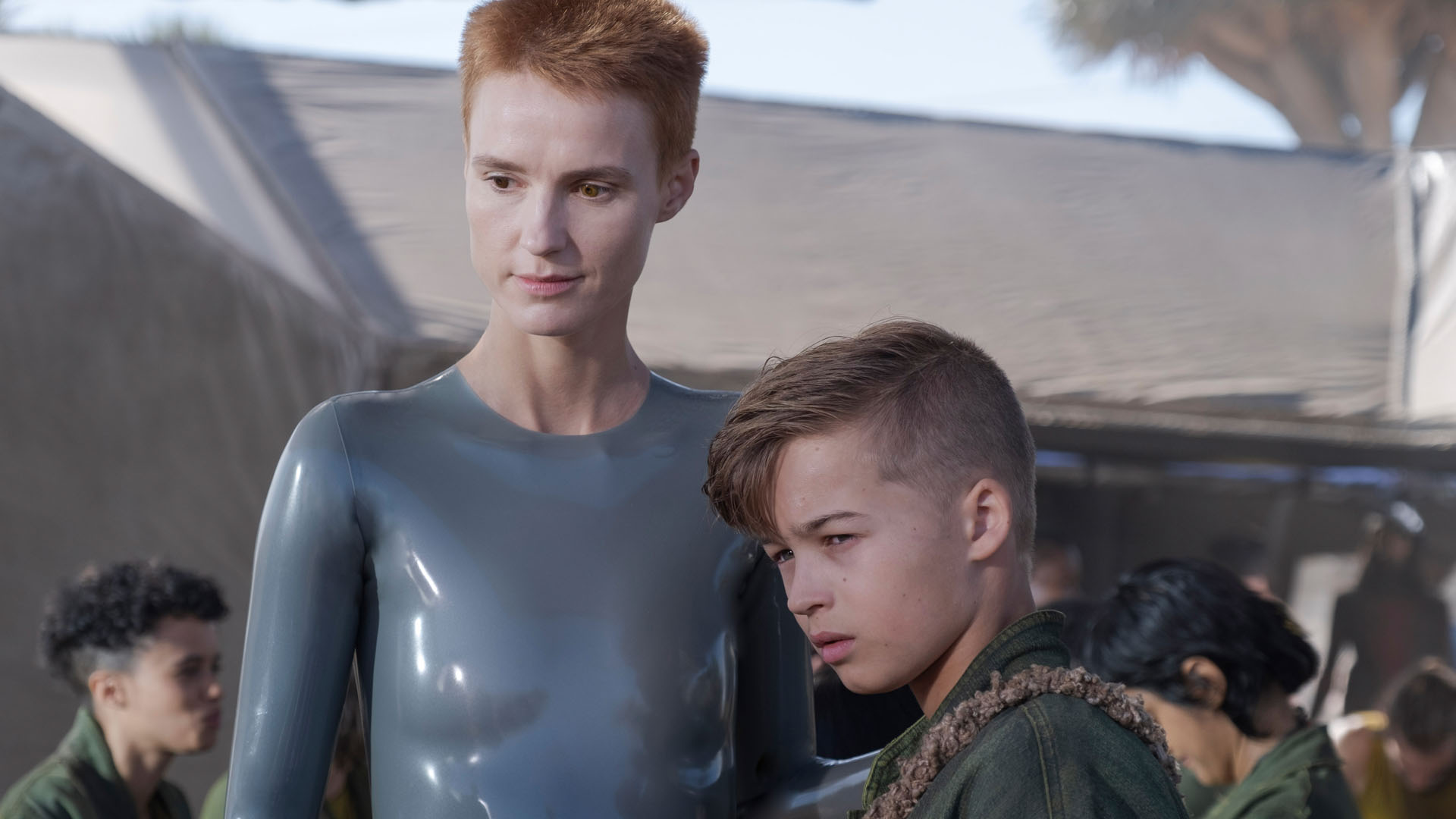
Season two shows even androids worry about who should look after children
AMANDA COLLIN: I think for Mother, there’s a big relief in finding another computer who looks like it’s taking care of everything. And I think that theme in general is a very interesting one.
Like, who do you give your trust to in order to function as a human being? And how do you leave your own instincts alone when you do that? Because we constantly—I constantly—try to give my control to someone. For the first part of my life, I gave it to my parents and then all of a sudden you take control yourself and I think that’s life basically.
And then you trust politicians and then you hate them. And then so it goes forth and back like that. I think for mother’s journey this season, it’s very interesting to see how she dims her instincts in order to follow authority. And I think that theme is very interesting to human beings.
ABUBAKAR SALIM: Amanda’s kind of hit the nail on the head in regards to this feeling of relaxation over the importance of trying to ensure the children’s safety and upbringing—because we now are comfortable knowing that they are going to be brought up in a society that essentially, we hope, believes the same things that we do.
It’s almost like a foot as a bit off the pedal in regards to how we parent these children. It’s more, in a sense, just supervising now. But then that creates a lot of room and space for other relationships and other spaces to develop.
AMANDA COLLIN: If I can interrupt Abu, it’s interesting that for you, it creates relaxation, and for Mother, it creates anxiety. It’s like sending your kids to school. Right? For the dads, it creates relaxation. And for the other parent, it creates a tremendous amount of anxiety—that letting go of your own control. And I think, yeah, it’s just such an interesting thing to discuss. Who you leave your children to?
NIAMH ALGAR: Well, I guess I was kind of looking after the kids for six months, while Mother and Father have been having a big sleep.
So by the time we get to the start of season two, Sue’s a bit tired of the kids—but also she’s been brought up a lot differently. Her understanding of family is quite fractured like it is with Marcus. They didn’t intend to be parents but used that as a tool in order to get onto a ship get to this new planet.
So they unintentionally became parents. It wasn’t something that she’d set out to do, but it is something that she began to quite warm towards. Then when she’s given the opportunity of being a mother she massively messes that up and ends up trying to rekindle that relationship.Once you see your parents no longer as parents, but as people, that’s when they have to work twice as hard to prove their worth and trust.
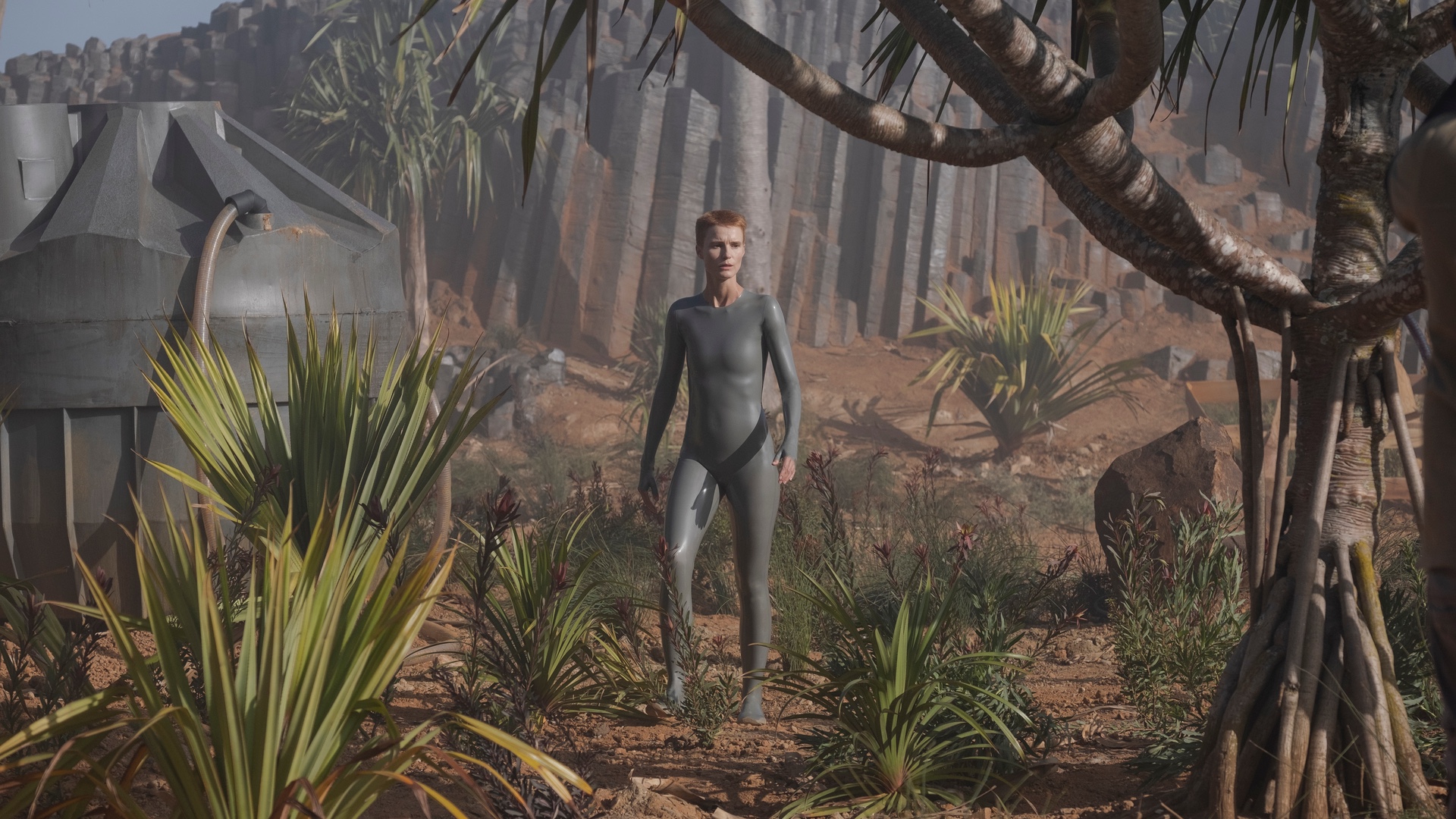
Should humanity colonise other planets, like Kepler-22b?
AARON GUZIKOWSKI: I’m not really a huge proponent for trying to get to other planets. I’m a huge proponent of trying to fix this planet. We’ve got a great atmosphere here and oxygen and all sorts of great things. And you know, Mars is a mess. Let alone getting there and such, it would not be fun living there. So, we’ve got a pretty great planet here, I would say, really try and make the most of this one.
Using Kepler-22b, was on purpose. I love the idea. Kepler-22b is a real exoplanet and it is actually in the Goldilocks zone of the Sun. It could conceivably be a place where we could settle the human race. We’re not sure, but that’s what people think in terms of the information we have now. And I really love writing about a real planet that I can’t really get close enough to see, because there’s always the smallest chance that you know what I’m writing is real.
It’s just cool, the idea that there’s many of these planets, Goldilocks planets that could potentially host human beings without the aid of technology.
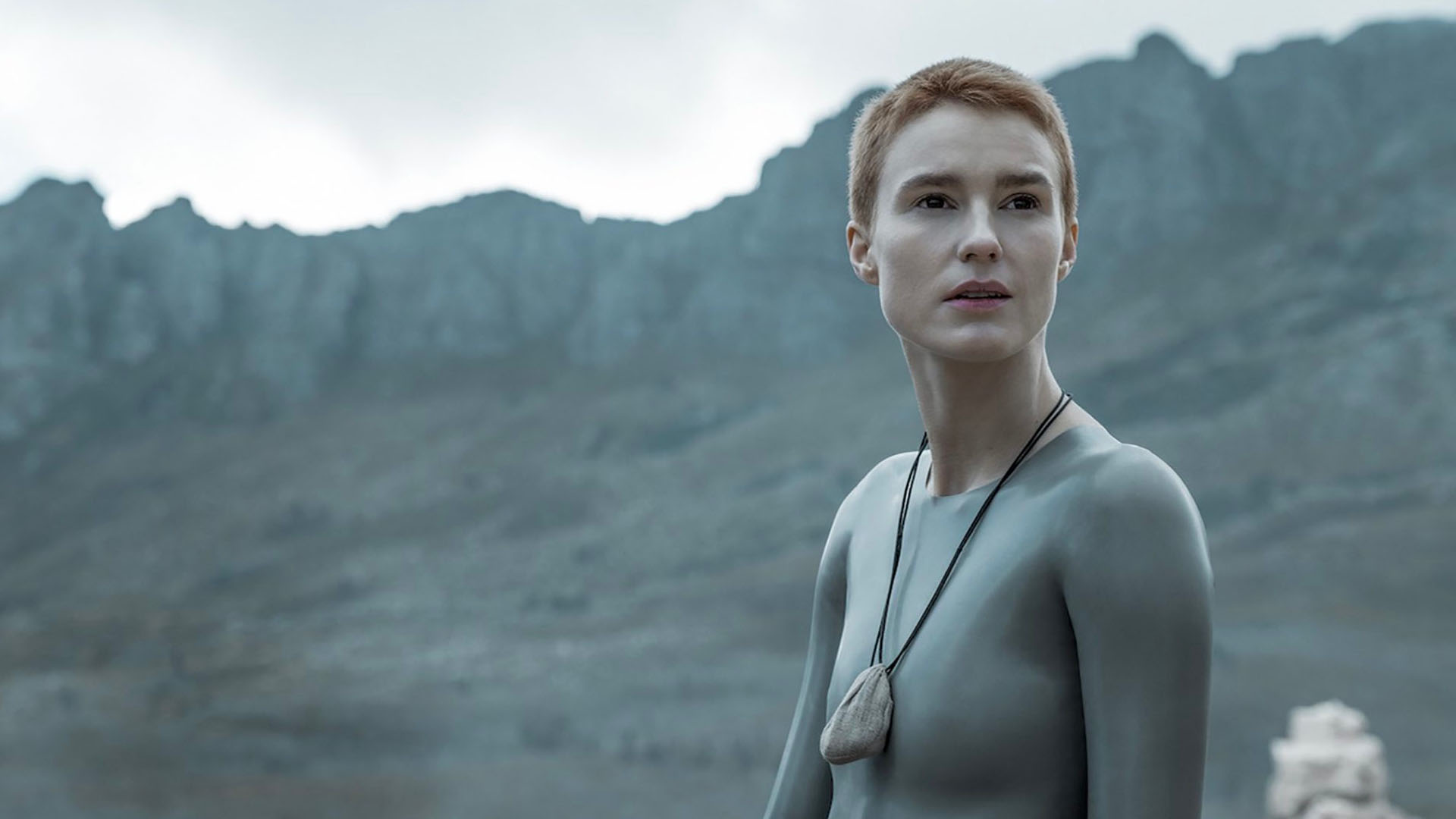
It’s technology that’s responsible for some of this season’s biggest acting challenges
AMANDA COLLIN: I know for me, it was definitely all the stuff with the Serpent who is in real life, a tennis ball on a stick.
And so that is definitely challenging stuff, when you go home and feel like the worst actor of the year, having just shouted at a broomstick for a whole day, for instance.
ABUBAKAR SALIM: I think anything with VFX and CGI is always a bit difficult because it’s that balance between whether, you know, it’s going to look good or you look like an idiot. Because you’re imagining this giant snake in the sky and you know Abu would think that’s hilarious. But of course, this is a dangerous creature. So I think, yeah, there were definitely challenges. But I think again, that’s part of the whole journey really of an actor, isn’t it?

















